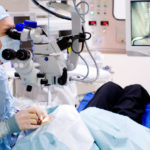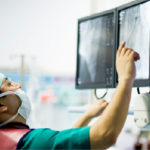How is Stage 1 Throat Cancer Treated?
In stage 1 throat cancer, the tumours are either limited (isolated) to either one part of the hypopharynx, or the tumour size is less than or equal to 2 cms in its greatest dimension.

These tumours can be treated with radical chemoradiation, minimally invasive surgery or conservative surgery. Systemic chemotherapy is rarely advised to stage 1 throat cancer patients.
Treatment for Stage 1 oropharyngeal throat cancer patients
The standard treatment for stage 1 oropharyngeal cancer is radical radiation therapy. This has an advantage over surgery, as it preserves organ function. Chemotherapy can also be used along with radiation. This is called concurrent chemo-radiation. This approach depends on the patient’s age, general health condition, and medical comorbidities.
In patients who refuse to receive radiation, surgery can be advised as an alternative option. Surgery in the form of transoral or open resection of a tumour.
Radiation is generally administered over a period of 6 to 7 weeks to a total dose of 66 to 70 Gy along with weekly concurrent chemotherapy. The most commonly used chemotherapy drug, in this case, is Cisplatin.
Treatment for Stage 1 hypopharyngeal throat cancer patients
Treatment options for the initial treatment of stage 1 hypopharyngeal throat cancers are similar to that of oropharyngeal cancers. Chemo-radiation is the standard treatment for stage 1 hypopharyngeal cancer. An alternative treatment option is a surgery, in the form of either minimally invasive surgery or the complete removal of the organ along with lymph node drainage.
When surgery is performed as the primary line of treatment, depending on the patient’s perceived risk of recurrence, they are also advised to undergo adjuvant radiation therapy or chemoradiation therapy in order to enable better treatment outcomes.
In some rare cases, radiation alone is advised as opposed to surgery. A follow-up scan is performed in such cases after the treatment is completed, and if there are any traces of cancer left, then a surgery is advised.



